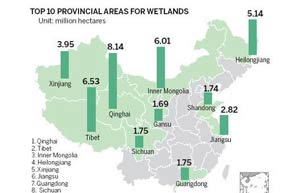In order to maximize lumber output, locals again turned to the wetlands in the 1990s, this time to grow pine trees in the wetlands.
Once more they ended in failure. The trees could not root properly and were easily toppled by strong winds.
"It was foolish from today's perspective. However, people had no choice then but to exploit the wetlands for subsistence," said Zhuo Lei, vice-director of Meixi Forestry Bureau of Yichun.
 |
 |
Data from the State Forestry Administration reveals China has a total of 53.6 million hectares of wetlands, accounting for more than 5 percent of the country's total terrain.
The Chinese leadership are emphasizing ecological protection, demanding increases in the size of forests, lakes, and wetlands. China boasts 577 nature reserves and 468 wetland parks. The push for preservation has gone as far as becoming part of the criterion for performance assessment of local government officials in some regions.
Protection efforts are facing renewed challenges, however, as locals, seeing rising incomes in the rest of the country, seek to cultivate the wetlands once more.
Local officials say there has been a recent increase in complaints lodged toward the protection campaigns from local residents, who claim they are being forced to change old lifestyles.
Locals say reasonable remunerations for those affected by the protection campaigns are necessary. However, such a scheme has not yet been established.
Without a compensation system in place there have been ongoing attempts to convert the wetlands to agricultural lands as incomes remain low in the underdeveloped region.
Meanwhile, experts say central and local government support of scientific development and tourism as well as husbandry could speed up the economic restructuring for these regions.
